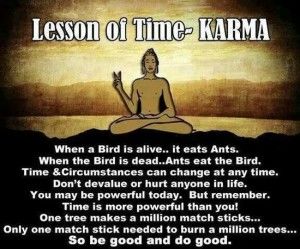Karma
Karma is a word that we all know well. In fact, we use it a lot! Karma is a way of looking at the world that seems to make total sense. And it’s a word for which there is no direct equivalent in the English language, maybe because this is an Eastern concept, and it is so different to Western religious beliefs.
So, what does karma mean?
In Sanskrit or Hindi, it is the word for action. In this case, ‘action’ is understood as Newton’s law of ‘every action must have a reaction’. When we think, speak or act we initiate a force that will react accordingly. This returning force may be modified, changed or suspended, but most people will not be able to eradicate it.
Karma entered English as a religious concept in the nineteenth century in the context of the Hindu and Buddhist traditions.
Non-religious speakers use the word interchangeably with the terms “fate” and “destiny.” They might also use it to mean “luck,” both good and bad, and acts as a sort of moral compass.

BUDDHA KARMA
Here are some of the fundamental laws of karma:
- “As you sow, so shall you reap.” This is also known as the “Law of Cause and Effect.”
- Whatever we put out in the Universe is what comes back to us.
- If what we want is Happiness, Peace, Love, Friendship… Then we should BE Happy, Peaceful, Loving and a True Friend.
On a lighter note, there is a joke to describe the interaction between people who cling to dogma and rigid beliefs and those who try to follow a more enlightened path: “My karma just ran over your dogma.”



















